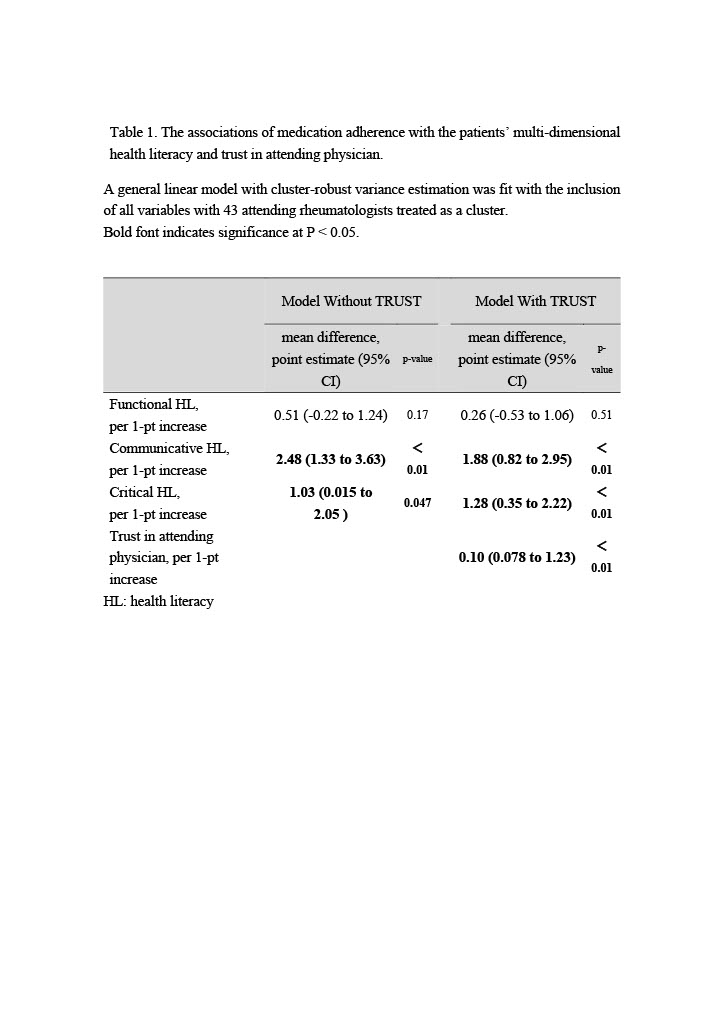Session Information
Session Type: Poster Session A
Session Time: 10:30AM-12:30PM
Background/Purpose: Maintaining medication adherence is crucial for improving health outcomes among patients with systemic lupus erythematosus, as they require life-long hospital visits and medications. Patients’ health literacy, possibly through good communication, fosters good therapeutic relationships with their rheumatologists, and trust in their usual rheumatologist has a positive impact on medication adherence. In this study, we will clarify the interrelationship between patients’ multidimensional health literacy, trust in their rheumatologist, and medication adherence.
Methods: This study is a cross-sectional analysis using initial data from the TRUMP2-SLE study, a continuing multicenter cohort study carried out at five academic centers. The main exposures were patients’ multi-dimensional health literacy, measured using the 14-item Functional, Communicative, and Critical Health Literacy Scale, with each domain ranging from 1 to 4 (3). Trust in attending physician was measured using the 5-item Wake Forest Physician Trust Scale, which ranged from 0 to 100 (4,5).Outcomes were medication adherence measured using the 12-item Medication Adherence Scale which scores ranging from 5 to 60 points (6). General linear models were fit after adjusting for age, sex, socioeconomic status, depression, medication variables , experiencing adverse effects, disease duration and the time spent on the internet to analyze the associations of health literacy (HL) and medication adherence. Whether trust in attending physician mediated this association was assessed using mediation analysis.
Results: A total of 483 SLE patients were included. The mean age of the patients were 46.4 years, and 428 (88.6%) women. Higher communicative and critical HLs were associated with better medication adherence (per 1-point higher communicative HL: mean difference 2.48, [95% confidence interval (CI): 1.33 to 3.63] and per 1-point higher critical HL: mean difference 1.03, [95% CI: 0.014 to 2.05], respectively). Mediation analysis showed that trust in their usual rheumatologist partially mediated the association between communicative HL and the medication adherence, while it did not mediate the association between critical HL and medication adherence.
Conclusion: A high ability to understand information and apply it to one’s own treatment (communicative HL) fosters enhanced trust in physicians, which in turn, facilitates improved medication adherence. Meanwhile, encouraging patients to critically analyze treatment and health information (critical HL) has shown potential to strengthen adherence. Apart from building trust, fostering critical HL is warranted to further improve medication adherence.
To cite this abstract in AMA style:
Oguro N, Yajima N, Ishikawa Y, Sakurai N, Hidekawa C, Ichikawa T, Kishida D, Hayashi K, Shidahara K, Miyawaki Y, Yoshimi R, Sada K, Shimojima Y, Kurita N. The Mediating Role of Trust in Usual Rheumatologists on the Relationship Between Multidimensional Health Literacy and Medication Adherence Among Japanese Systemic Lupus Erythematosus Patients [abstract]. Arthritis Rheumatol. 2024; 76 (suppl 9). https://acrabstracts.org/abstract/the-mediating-role-of-trust-in-usual-rheumatologists-on-the-relationship-between-multidimensional-health-literacy-and-medication-adherence-among-japanese-systemic-lupus-erythematosus-patients/. Accessed .« Back to ACR Convergence 2024
ACR Meeting Abstracts - https://acrabstracts.org/abstract/the-mediating-role-of-trust-in-usual-rheumatologists-on-the-relationship-between-multidimensional-health-literacy-and-medication-adherence-among-japanese-systemic-lupus-erythematosus-patients/

